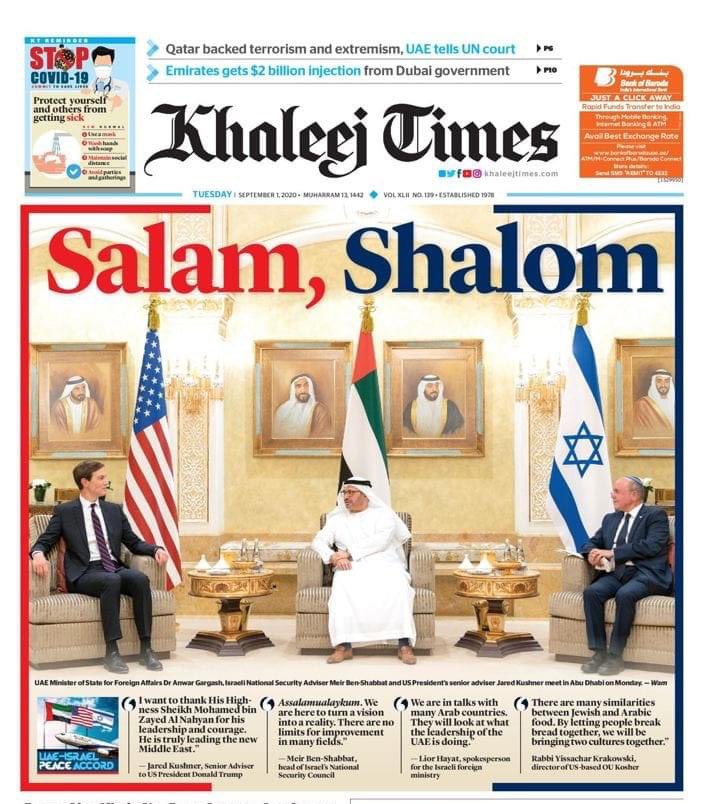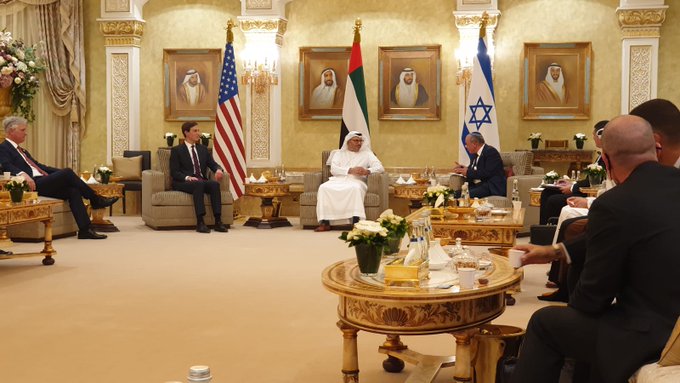A tectonic shift in the relations between Israel and Arab world
Over the past decade or so I have reported from around 100 countries. I have been in the White House during the good moments (with US President Donald Trump) and during the bad moments (with then-President Barack Obama).JPost Editorial: The UAE-Israel deal could mark a new dawn for relations in the Middle East
I have witnessed the return of the remains of an Israeli MIA through Moscow, and traveled with Prime Minister Benjamin Netanyahu to Uganda, Brazil Ethiopia and Beijing for his diplomatic visits. But the flight from Tel Aviv to Abu Dhabi was something completely different.
It underscores the major breakthrough between the UAE and Israel. The fact that El Al's Star of David flew over Saudi Arabia symbolizes the tectonic shift underway in relations between Israel and the Arab world. Israel made a giant leap forward on Monday in its effort to integrate in the region and be like any other normal country. The hostility and the boycotts are now a thing of the past, a new era of cooperation and friendship has begun.
The enormity of these developments was palpable among all those who were on board, not just the Israeli and US officials but also the flight crew and reporters. Everyone talked about how it was such a great privilege to be taking part in this historic event. Special face masks decorated with the flags of the US, the UAE and Israel were handed out; the boarding passes also had a special design.
It's also worth noting that throughout the three-hour flight, Israeli and US officials sat next to each other as if they were family or citizens of the same nation. Such closeness among the senior members of both governments is unprecedented. This intimacy in and of itself is an accomplishment that stands out.
The new dawn that is the UAE-Israel relationship is not just built on practical issues such as economics and security. It is already being built on human relationships. Whether it is stories about kosher deli service for the Expo in the Emirates, or the small but thriving Jewish community, we can see that there is a very real human warmth that is emerging in Abu Dhabi and Dubai towards Israel.David Singer: Saudi Arabia is impeding Trump's effort to end the conflict
This warmth goes both ways. Israelis have lit up their buildings with the UAE flag, and opened their hearts to the possibilities of peace. This is welcome news during the COVID-19 crisis and the way that the world’s nations and citizens have become isolated and cut off from one another.
The symbolic visit to the Western Wall by Kushner prior to the historic flight and the morning prayers in the UAE bookend this phenomenal trip.
However, we must not glory only in success and fanfare. Too often our presumptions, and sometimes arrogance, have clouded reality. There is a long road ahead in the UAE, just as there have been hurdles in the Jordanian and Egyptian peace agreements.
There are questions about US F-35 sales to the Emirates. Israel is divided on whether the sales would erode its qualitative military advantage. It will take years for F-35 sales to materialize, even if approved in the US. By that time, Israel will have several squadrons of the advanced aircraft.
There may be other hurdles as well, such as the UAE wanting to see some progress on issues in the West Bank, or Iran and Turkey seeking to throw a spanner into the process. Israel and the UAE have dangerous enemies, from Tehran to the Muslim Brotherhood, of which Hamas is a part. Navigating the US election and Washington’s increasingly partisan foreign policy will be difficult.
We can face the future together with the UAE. This week began what should be a beautiful friendship.
Israel’s then Prime Minister Ehud Olmert announced Israel’s readiness to resume negotiations with the Palestinian Authority “based on previous agreements between us, U.N. Security Council Resolutions 242 and 338, the road map and the April 14, 2004 letter of President Bush to the Prime Minister of Israel.”
No mention was made of the API forming part of those renewed negotiations – nor could it be - since its total territorial withdrawal demands had been undercut by the Bush Congress-endorsed letter.
Those Arab nations and entities – indeed all parties present at the Conference - failed to object or demur to the new territorial reality of partial Israeli withdrawal which the Bush letter had engendered.
Saudi Arabia’s insistence on Israel’s total territorial withdrawal stipulated by the API as the price to be paid for Saudi Arabia signing a peace treaty with Israel has been seemingly backed by Sudan,Bahrain and Oman to prolong the 100 years-old Arab-Jewish conflict.
The Trump vision for peace is a plan that can end that conflict. It needs to be embraced by all who attended the Annapolis Conference – especially by Saudi Arabia, Sudan, Bahrain and Oman now joining the UAE as real trailblazers for peace.
Trump did not present his meticulously detailed deal of the century to see it rejected before its implementation was even attempted.
Pressure by top Trump aides in the region this week to get Saudi Arabia to endorse Trump’s plan is certain.
Failure to do so could see Trump administering his proven shockwave therapy to jolt Sudan,Bahrain and Oman from backing Saudi Arabia’s continuing rejection of Trump’s plan.









































